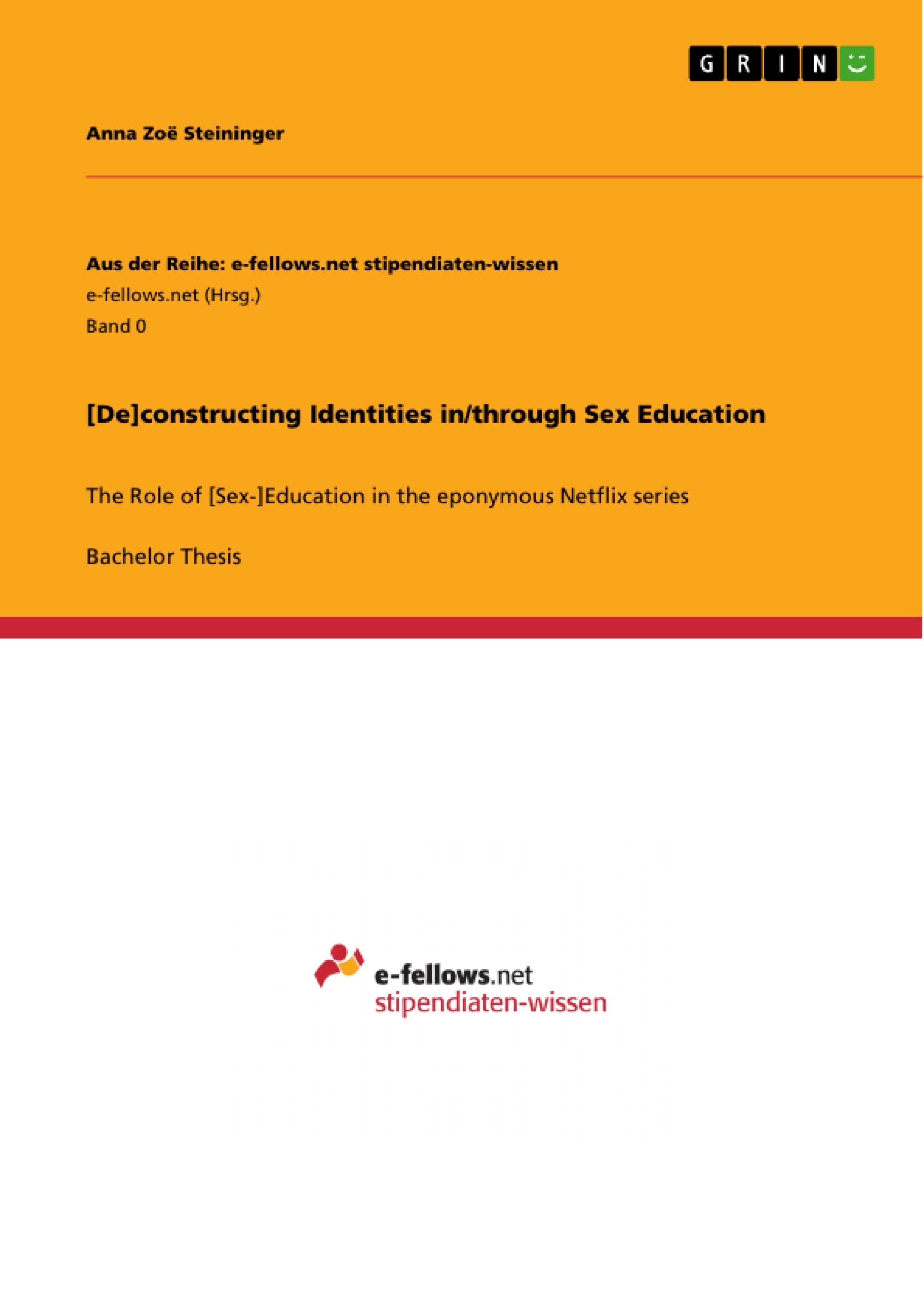When the British comedy-drama series Sex Education debuted on Netflix in 2020 (with three further seasons following in 2020, 2021and 2023), screenwriter Laurie Nunn’s show was welcomed by critics and audiences alike as an innovative addition to the often rather formulaic canon of cinematic teen narratives. This paper will investigate on various levels what role the eponymous [Sex-]Education plays in the series.
Education is part and parcel of Sex Education. While telling a story that focuses on the lives of students, parents and teachers of Moordale Secondary School, including [sex-]educational matters in the plot, the show clearly has its own didactics to eventually educate its spectators. On the one hand, conventional educational systems, and mechanisms of socialization such as school, therapy, family, and popular culture are part of the plot, which makes visible the kind of influence these might have on adolescent identity formation. On the other hand, common educational structures are taken and playfully converted. Also, well-known educational hierarchies are mentioned, are deconstructed, and finally re-emerge, their original order reversed. The spectator is presented with the question “Who educates who?”. Normative, conventional forms of relation are often dissolved and new forms of companionship or even kinship are established.
The series subjects its protagonists as well as its spectators to dichotomies such as direct/indirect education and conscious/unconscious education and it mirrors the different ways in which education can affect and [de-]construct identity. The series investigates the relation between power and knowledge, ultimately obtained through education, it negotiates questions regarding the place and the way in which people receive and share education and it reveals how ideologies are imparted and how they direct a certain discourse.
For my analysis of how Sex Education/[Sex-]Education [de-]constructs identities, educational systems and institutions, uncommon educational structures and the development of the characters and their relations within the diegesis and on a metatextual level, the series’ didactics will be considered. Recourses to conceptual works by Judith Butler, Kimberley Crenshaw, Donna Haraway, Louis Althusser, and Timothy Shary will be mobilized to conceptualize the manifold role education plays in this show.
Table of Contents
- Introduction
- Classic forms of education in the series – Ideological state apparatuses in Sex Education
- School
- Therapy
- Family
- Popular culture
- The role of popular culture as an educational tool
- An intertextual approach: How Sex Education makes the history of queer popular culture visible
- Transgressing normativity – Comic writing and aliens as form of escapism
- The binary choice of one's sexuality: “A match between equals. Only one can survive.”
- Teenagers as producers and consumers of porn
- The Sex Clinic - A hybrid between school and therapy
- School’s deficiency: “Fit-for-purpose school-delivered information”
- Education between school and therapy
- Labelling - Blessing or curse?
- Knowledge does not mean you’re safe – What it takes to be a “normal teenager”
- Who educates who? - Educational hierarchies reversed
- Child/Parents
- Parentification – “Would you rather I told them that mum’s a junkie and that dad fucked off?”
- When a mother therapizes her child…
- Imprisonment through normative education – The fear of not being the “real mum”
- Like father, like son.
- Students teaching their teachers
- The sufferer transforming his bully – An obsolete narrative?
- “Make kin!”
- [De-] constructing the spectator’s identity through [sex-] education
Objectives and Key Themes
This paper investigates the role of [Sex-] Education in the Netflix series Sex Education. The series offers an innovative approach to traditional teen narratives by exploring adolescent sexuality in diverse contexts, including school, therapy, family, and popular culture.
- The influence of various educational systems and socialization mechanisms on adolescent identity formation.
- The exploration and deconstruction of conventional educational structures, such as the Sex Clinic, which acts as a hybrid between school and therapy.
- The investigation of educational hierarchies and their reversal, focusing on the question "Who educates who?".
- The examination of how education affects and deconstructs identity, both empowering and imprisoning individuals.
- The exploration of the relationship between power and knowledge, as acquired through education, and its impact on ideology and discourse.
Chapter Summaries
The introduction delves into the unique aspects of the show, highlighting its approach to adolescent sexuality and its focus on diverse identities and intersecting issues. It establishes the show's place at the intersection of information seeking, communication, and societal context.
Chapter 1 explores the various forms of education present in the series, including the ideological state apparatuses of school, therapy, family, and popular culture. It examines how these influence adolescent identity formation and reveals the role of popular culture as an educational tool.
Chapter 2 analyzes the Sex Clinic, presenting it as a hybrid between school and therapy. It discusses the shortcomings of traditional school-delivered information and explores the dynamics of education between school and therapy. Additionally, it delves into the implications of labeling and the challenges of achieving "normal" teenage identity.
Chapter 3 focuses on the reversal of educational hierarchies, particularly between children and parents. It examines phenomena such as parentification, parental therapy of children, and the impact of normative education on identity construction. The chapter also explores instances of students teaching their teachers and the possibility of a sufferer transforming their bully.
Keywords
The key themes and concepts in this analysis encompass various aspects of education, identity formation, and societal influences. These include [Sex-] Education, adolescent sexuality, gender identity, sexual orientation, popular culture, school, therapy, family, power, knowledge, ideology, discourse, and the deconstruction of identities.
- Quote paper
- Anna Zoë Steininger (Author), 2023, [De]constructing Identities in/through Sex Education, Munich, GRIN Verlag, https://www.grin.com/document/1420158

![Title: [De]constructing Identities in/through Sex Education](https://cdn.openpublishing.com/thumbnail/products/1420158/large.webp)


